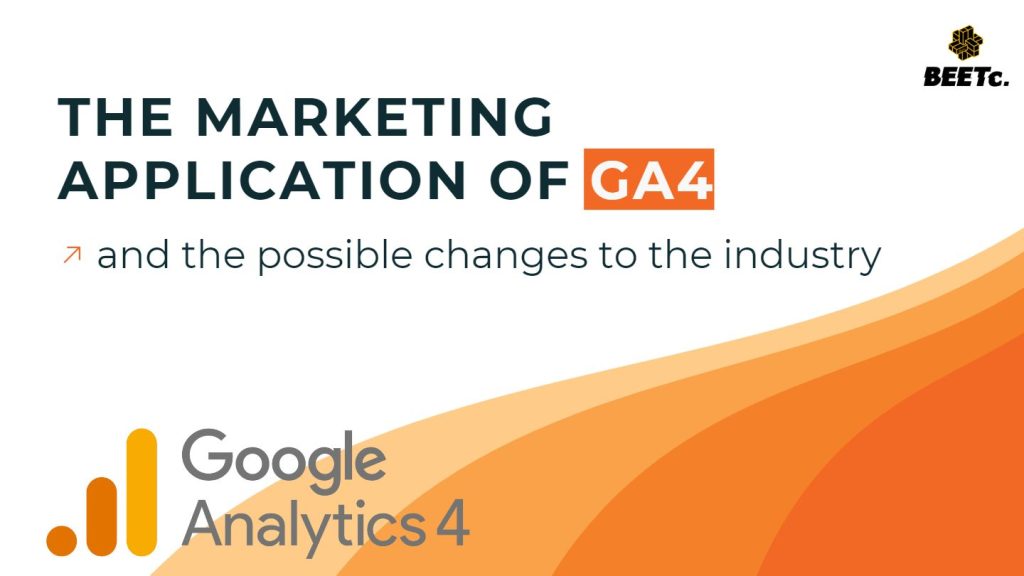
Google Analytics 4 (GA4) is a game-changing analytics platform that offers businesses greater flexibility, an emphasis on privacy, and advanced insights into customer behaviour. As more companies adopt GA4, marketers can expect significant changes in the industry, from improved attribution data and a deeper understanding of user interactions to an increased focus on data privacy and compliance.
This article explores GA4’s new features, their impact on the marketing industry, and the challenges and opportunities of transitioning to this innovative platform. By adapting to GA4 and embracing its powerful capabilities, marketers can stay ahead of the curve and drive better results in a rapidly evolving digital landscape.
What is GA4, and How is it Different from UA?
Google Analytics 4 (GA4) represents a significant shift in how businesses measure and analyse cross-platform digital performance. Unlike its predecessor, Universal Analytics (UA), Google designed GA4 to be more flexible, privacy-focused, and event-driven.
These changes give businesses a deeper understanding of the user journey and behaviour across various platforms and devices. This transition reflects Google’s commitment to helping companies to adapt to the evolving digital landscape and the growing emphasis on user privacy.
The primary differences between GA4 and UA lie in their data collection and reporting capabilities. GA4’s event-based tracking model enables more precise attribution and offers advanced features for analysing customer behaviour, such as advanced segmentation, customer lifetime value, and churn prediction. Additionally, GA4’s privacy-first approach incorporates consent management and enhanced data privacy features, ensuring businesses can maintain compliance with changing regulations.
The marketing industry and how companies manage analytics are changing significantly as more companies switch to GA4. With more accurate attribution data, an emphasis on privacy, and new insights into customer behaviour, marketers can make better-informed decisions and develop more effective strategies. GA4’s transformative impact on the industry will challenge marketers to evolve, adapt, and innovate to stay ahead of the curve.
Marketing Applications of GA4
More accurate attribution data
• Event-based tracking
GA4’s event-based tracking model significantly improves how marketers measure user interactions on their websites and apps. Instead of relying solely on pageviews, GA4 tracks a wide range of user events, such as clicks, scrolls, and form submissions, providing more comprehensive user behaviour analytics.
This granular data allows marketers to gain a deeper understanding of user engagement, enabling them to optimise campaigns and make data-driven decisions to improve their overall marketing performance.
• Cross-platform and cross-device tracking
Understanding user behaviour across different platforms and devices is essential for creating effective marketing strategies in a multi-device landscape. GA4 addresses this challenge by offering advanced cross-platform and cross-device tracking capabilities.
By unifying user data from websites, apps, and other digital touchpoints, GA4 provides a holistic view of the customer journey. This seamless integration enables marketers to analyse user behaviour across devices, creating more personalised and targeted campaigns that resonate with their audience and drive better results.
Emphasis on privacy
• Consent mode
As privacy regulations evolve, GA4 introduces Consent Mode, a feature that helps marketers better manage user consent for data collection. Consent Mode allows businesses to customise their analytics setup based on user consent, ensuring they only collect data from users who have granted permission.
By integrating user consent into their analytics framework, marketers can maintain compliance with data privacy laws while obtaining valuable insights to inform their marketing strategies.
• Enhanced data privacy features
GA4 strongly emphasises data privacy, offering a range of features to help marketers protect user data while staying compliant with privacy regulations. For example, GA4’s data retention settings allow businesses to control how long user data is stored, helping them adhere to data minimisation principles.
GA4 enables marketers to anonymise IP addresses and restrict collecting specific data, ensuring higher user privacy. By prioritising data privacy, GA4 empowers marketers to build trust with their audience while providing the necessary flexibility to comply with ever-changing privacy laws.
New features for understanding customer behaviour
• Advanced segmentation
GA4 introduces advanced segmentation capabilities, enabling marketers to better understand customer behaviour by grouping users based on shared characteristics or actions. This enhanced segmentation allows businesses to create highly targeted marketing campaigns tailored to specific audience segments.
By leveraging advanced segmentation, marketers can gain deeper insights into customers’ needs, preferences, and behaviour, resulting in more effective and personalised marketing strategies.
• Customer lifetime value and churn prediction
GA4’s customer lifetime value (LTV) and churn prediction features provide valuable insights to help marketers optimise customer acquisition and retention efforts. By analysing user behaviour and engagement data, GA4 can estimate the potential value of individual customers over time and predict the likelihood of customer churn.
With this information, marketers can make data-driven decisions to improve customer retention, allocate resources more efficiently, and prioritise high-value prospects, ultimately driving better marketing outcomes and business growth.
• Path analysis and funnel reporting
GA4 introduces enhanced path analysis and funnel reporting capabilities, allowing marketers to understand the customer journey better and identify critical touchpoints within their marketing funnels. By visualising the paths users take through a website or app, marketers can pinpoint areas where users might drop off or engage more deeply, optimising their strategies accordingly.
GA4’s advanced funnel reporting enables marketers to create custom funnels, measure conversion rates, and identify potential bottlenecks. Marketers can use these insights to refine marketing campaigns, improve user experience, and drive higher conversion rates and customer satisfaction.
Impact of GA4 on the Marketing Industry
Better-informed decision-making
Data-driven marketing is crucial for businesses to make well-informed decisions backed by measurable insights. GA4’s new features contribute significantly to facilitating smarter marketing choices.
With enhanced attribution data and a deeper understanding of customer behaviour through advanced segmentation and improved funnel reporting, marketers can tailor their strategies more effectively to meet consumer needs and preferences.
As a result, businesses can optimise their marketing efforts, drive customer engagement, and stay ahead of the competition by capitalising on the valuable information provided by GA4.
Improved marketing strategies
• Personalisation and targeting
GA4’s enhanced features enable marketers to deliver more personalised and targeted customer experiences. With advanced segmentation and insights into user behaviour, businesses can create tailored marketing campaigns that resonate with their audience. This approach improves customer satisfaction and drives better engagement and conversion rates, leading to higher ROI for marketing efforts.
• Attribution modelling and optimisation
GA4’s improved attribution data allows marketers to better understand which marketing channels and touchpoints contribute most to their goals. By analysing this information, businesses can optimise their marketing strategies, allocate resources more effectively, and focus on the channels that deliver the best results.
This shift towards data-driven attribution modelling enables organisations to maximise their marketing impact and achieve greater success in a competitive industry.
• Cross-channel and cross-device marketing campaigns
GA4’s cross-platform and cross-device tracking capabilities empower marketers to create seamless and consistent marketing campaigns across various channels and devices. This comprehensive tracking approach ensures that businesses can engage with their customers at every touchpoint, regardless of the device or platform they are using.
By leveraging GA4’s advanced tracking capabilities, marketers can deliver a unified brand experience that fosters customer loyalty and drives long-term success in the ever-evolving digital landscape.
Adapting to a privacy-first era
• Shift towards first-party data collection
As the marketing industry embraces a privacy-first approach, businesses must prioritise first-party data collection to stay ahead. GA4’s consent mode and enhanced data privacy features facilitate this shift by enabling marketers to collect valuable customer data while respecting user privacy.
By focusing on first-party data, businesses can foster trust with their audience and maintain a sustainable marketing strategy that complies with evolving privacy regulations.
• Navigating the phasing out of third-party cookies
The impending disappearance of third-party cookies poses a significant challenge for marketers, as these cookies have long been the backbone of targeted advertising. GA4’s emphasis on privacy and first-party data collection helps businesses navigate this changing landscape.
By adapting to GA4’s privacy-focused features, marketers gain valuable insights into customer behaviour while staying compliant with stricter privacy regulations, ensuring their marketing efforts remain effective and ethical.
The Transition to GA4
Potential challenges and solutions
Challenge: Steeper learning curve for GA4 compared to Universal.
Analytics Recommendation: Invest in training and resources to help your team become proficient with GA4.
Challenge: Potential data gaps during the transition process.
Solution: Run GA4 and Universal Analytics in parallel to ensure data continuity. Consider hiring GA4 migration experts to implement a successful transition following best practices.
Challenge: Adapting to event-based tracking.
Recommendation: Plan and define key events for your business to maximise this new tracking approach.
Challenge: Ensuring data privacy compliance.
Solution: Utilise GA4’s consent mode and stay up-to-date with privacy regulations.
Challenge: Managing the shift towards first-party data collection.
Recommendation: Develop a strategy for effectively collecting and utilising first-party data.
Challenge: Navigating the phasing out of third-party cookies.
Solution: Explore alternative tracking methods and technologies that prioritise user privacy.
Best practices for making the most of GA4’s features
- Implement both GA4 and Universal Analytics in parallel to ensure data continuity during the transition
- Be prepared for 1 July 2023, when Google stops processing UA data
- Take advantage of GA4’s event-based tracking by defining and setting up key events relevant to your business
- Utilise cross-platform and cross-device tracking to better understand the customer journey
- Leverage consent mode to collect data in a privacy-compliant manner
- Use advanced segmentation to identify and analyse high-value customer groups
- Incorporate customer lifetime value and churn prediction metrics to inform marketing strategies
- Employ path analysis and funnel reporting to optimise conversion paths
- Personalise and target marketing campaigns based on user behaviour and preferences
- Experiment with various attribution models to find the best fit for your business
- Focus on first-party data collection and explore alternatives to third-party cookies
About this Article
If you enjoyed reading this blog post and you are eager to enhance your marketing strategies, make sure to check out Metric Labs. Metric Labs’ team of experts can provide you with seamless assistance in migrating to Google Analytics 4, ensuring a worry-free transition. Discover how they can help you elevate your business to new heights. Contact them today at hello@metriclabs.com.au!
Find out more insights at our MarTech Content Library













